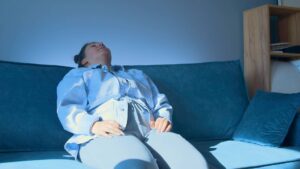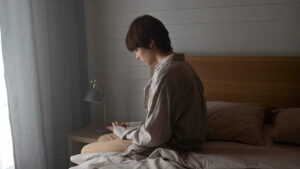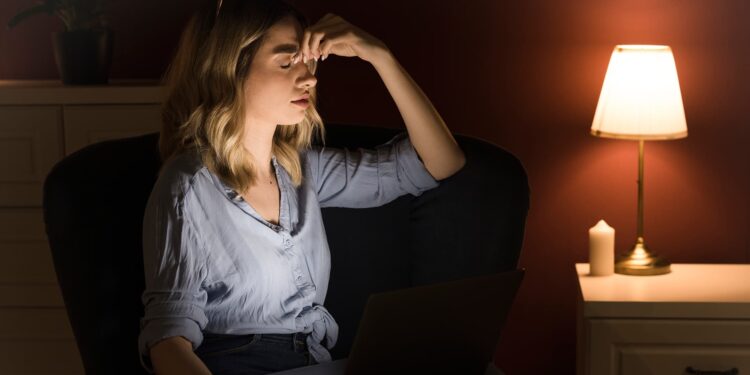The Anxiety-insomnia connection often coexists, forming a stressful cycle that can be challenging to break and at times is too frustrating for a person. Nonetheless, insomnia is common in people with anxiety disorders and it can remain even after anxiety-focused cognitive behavioral therapy.
It is crucial to cure insomnia to improve the quality of life for those receiving therapy for anxiety. Therapists may help these patients achieve better long-term results by including insomnia-specific therapies.
Anxiety and insomnia co-exist because people with anxiety are always worried or alert, they may have trouble falling or staying asleep.
Conversely, insomnia, or inadequate sleep, can exacerbate anxiety by raising stress levels and causing people to worry more about getting too little sleep.
Key Takeaways of Anxiety-insomnia Connection

- Anxiety and sleep loss are strongly related and can exacerbate one another. It is crucial to address both at the same time.
- The cycle can be broken and anxiety and sleep problems can be improved with therapy, medicine, and lifestyle modifications like practicing excellent sleep hygiene.
- Speaking with a physician can help determine the best course of action for you if these issues continue.
- You may start a positive cycle that results in greater sleep and less worry by concentrating on enhancing both mental health and sleep.
Why does the Anxiety-insomnia Connection?

There is a link between anxiety-induced insomnia,
Hyperarousal: Anxiety makes it difficult to fall asleep at night because it keeps your body and mind on high alert.
Loops of Worry: Insomnia sufferers frequently worry about the consequences of sleep deprivation, which worsens their anxiety.
What Is Anxiety?
Feelings of concern, fear, or anxiousness are called anxiety. Anxiety is common, especially before a significant test or a job interview. However, worry can strike for no apparent reason and persist for some people. At this point, could be classified as an anxiety condition.
What Is Insomnia?
The inability to fall asleep is known as insomnia. It may appear as follows:
- Having a difficult time falling asleep
- Waking up frequently at night
- Feeling exhausted Even after sleeping
Symptoms People may experience Anxiety and insomnia
From Anxiety
- Tension
- Tiredness
- Inability to focus
From insomnia
- Sleepiness during the day
- Lack of motivation and attention
- Mood fluctuations (depression, irritation)
- Concerning your sleep
Which Is Worse in Anxiety and Insomnia?
It may be difficult to tell. While some people experience anxiety as a result of insomnia, others experience anxiety as a result of sleep issues.
Anxiety associated with insomnia may be present in those who are just concerned about their sleep. However, anxiety disorders may be the underlying reason if stress permeates everyday life.
Anxiety-insomnia link: A Brief Overview of the Research conducted by NIH

This study examined the relationship between anxiety and insomnia (difficulty sleeping) throughout treatment, particularly cognitive behavioral therapy (CBT), a prevalent anxiety treatment. It searches for responses to two primary queries:
- Do insomnia and anxiety have an impact on one another during treatment?
- Which anxiety disorders are most closely associated with insomnia?
Nonetheless, 326 individuals were involved in the research with anxiety that were undergoing cognitive behavioral treatment at a facility.
Researchers measured the severity of anxiety and the degree of difficulty sleeping (insomnia). This was examined before, throughout, and following therapy.
They examined if sleep issues made it more difficult to lower anxiety and whether patients’ sleep improved after therapy. Additionally, they examined which anxiety disorders—such as OCD, panic disorder, GAD, and PTSD—had the most severe sleep issues.
What Did They Discover about Anxiety and Insomnia?
- Sleep Issues Got Better, But Not Totally:
In most cases of anxiety and sleeplessness, treatment helps patients with their sleeplessness.
Even after treatment, the people who suffered from the worst insomnia continued to have trouble sleeping.
- Improvements in Anxiety Were Unaffected by Insomnia:
During therapy, people made good progress in lowering their anxiety levels, regardless of how much or little they had difficulties sleeping.
- Insufficient Two-Way Impact:
During treatment of can’t sleep anxiety, had little effect on one another. For instance, improving sleep did not always result in lowering anxiety, and vice versa.
- Sleep Made Some Anxiety Disorders Worse:
Even after controlling for connections with other disorders, the two Anxiety-insomnia conditions most strongly associated with severe insomnia were PTSD and generalized anxiety disorder (GAD).
Nonetheless, why does this matter?
- Sleep Issues Require More Care: Although anxiety treatment can be beneficial, many people will still experience difficulty falling asleep. They might require individual insomnia treatment.
- Not a Barrier to Treatment for Anxiety: Individuals who suffer from severe insomnia can still benefit from treatment for anxiety, so they shouldn’t shy away from therapy because they have trouble falling asleep.
- Focus on Specific Groups: Due to their increased risk of severe insomnia, those with PTSD or GAD may require additional sleep assistance.
What Is the Connection Between Anxiety and insomnia?
When a person is anxious, the mind is frequently racing with concerns or fears, which makes it difficult to fall asleep.
Anxiety might keep you from getting a good night’s sleep by making your body feel anxious or tense.
If you’ve previously experienced insomnia, you may fear that you won’t be able to fall asleep again, which can make you feel more anxious.
Insufficient sleep can exacerbate your worry the next day, resulting in a vicious cycle that is difficult to overcome.
Common Signs That You Could Be Feeling Both
- You worry about your day and future when you’re awake.
- You feel exhausted and overburdened when you wake up.
- You fear that you won’t sleep, therefore you dread going to bed.
- Throughout the day, you experience restlessness or irritation.
The Impact of Insomnia and Anxiety on Life
When combined, they decrease motivation, raise mistakes, and impair energy levels. They may eventually even result in depression.
People who don’t get enough sleep are more susceptible to negative emotions because sleep is crucial for controlling emotions.
Options for Treatment
Cognitive behavioral therapy, or CBT,
CBT for Insomnia (CBT-I) teaches people how to modify their thoughts or habits that interfere with their sleep.
Cognitive behavioral therapy for anxiety reduces worry and develops better-coping mechanisms for stressful situations.
Medications:
Commonly prescribed drugs like SSRIs and SNRIs may be helpful for anxiety, but some may make insomnia worse. Physicians can try drugs that help with sleep or change the schedule.
For insomnia: Melatonin, sleep support, and other drugs can help you get a better night’s sleep. These frequently function best when paired with modifications to one’s lifestyle.
Sleep hygiene and lifestyle
- Maintain a regular sleep routine.
- Establish a calming sleep habit, such as reading or taking a bath.
- Steer clear of alcohol, caffeine, and screens right before bed.
- To encourage better sleep, get some exercise during the day.













